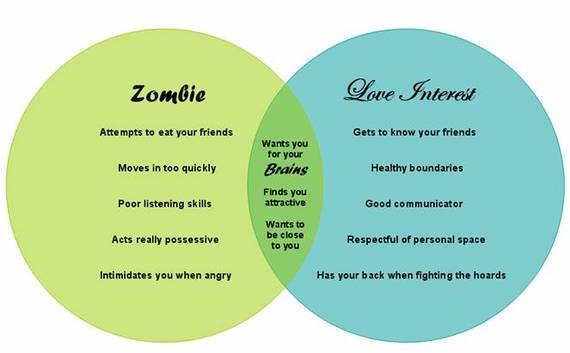By: Paulette Penzvalto
Wide shot: A beautiful person is singing and wandering alone through the wood; they happen upon a handsome stranger (insert mental image of Norman Reedus here). They fall in love instantaneously, sing a curiously well-rehearsed duet and defeat the zombie hordes together, before riding off on horseback into a perfect sunset.End scene.
Unfortunately, finding love is rarely that simple, especially for individuals on the autism spectrum. While it is universally acknowledged that wandering alone while singing can be a great way to attract attention, for someone who struggles with social cues, it can often be difficult to distinguish between a handsome prince and a handsome zombie.
Important note: while romantic, riding on horseback is about the least safe mode of transportation during a zombie apocalypse.
How are people with autism supposed to find love in a world where zombies and love interests often display many of the same characteristics?
BE ABLE TO DEFEND YOURSELF
To get some answers, I interviewed MatanGavish, founder and chief instructor of KravMaga Academy in New York City. A former KravMaga trainer for a special-ops unit in the Israeli Defense Forces, Matan has also trained Navy Seals and US Army Rangers, and appeared as an expert on the television show Doomsday Preppers.
PP: How can training assist in developing awareness and increasing safety in dating?
MG: KravMaga training puts you in positions of stress in a safe and controlled environment. You practice situations that are taken directly from the dangers of everyday life. You learn to recognize body language and other tell signs of violence, before it occurs and react accordingly.
PP: What are specific signs that an individual who struggles with processing issues is in a dangerous situation?
MG: Those who struggle with processing issues might have a harder time differentiating subtle changes in body language or micro expressions, however there are big signs that everyone can be aware of:
The ability to leave. If you cannot immediately remove yourself from a situation, it might be a dangerous one.
Feelings of pain and discomfort brought on by another person. If a person causes pain or restricts your movement, this is a sign of a dangerous situation.
Saying "No" is not working. You should be able to stop unwanted "romantic" physical advances by simply saying "No" or "Stop." If a person ignores your verbal request to stop, you might be in a dangerous situation.
PP: What are some basic things we can begin to do to be safer when we date?MG: One of the most important elements of safety in dating is to avoid seeing complete strangers. Try to use your own circle of family, friends, co-workers, etc., to make introductions to people they know and trust. When you meet, try to meet in a public, neutral place, like a restaurant or a bar. It's okay to see a person more than once in a public place, before putting yourself in a private one-on-one situation with them.
If you miss all the signs of danger and you end up facing violence, it is important to know how to defend yourself and get out of that situation. This is the type of training we provide in KravMaga Academy and it's important for all people, regardless of having processing issues. Even those who are not on the spectrum sometimes miss, or willfully ignore, big red flags.
PP: Matan, what are your words of wisdom for post-apocalyptic survival?
When it comes down to it, either in a post-apocalyptic scenario, or at the onset of an assault, you must remember that you have only yourself to rely on. Individuals must work on developing their skills before they find themselves in a dangerous situation. For example, swimming is a wonderful exercise, but it is also a lifesaving skill when faced with the dangers of drowning. KravMaga is also a wonderful workout, but the knowledge and skills provided in training can mean the difference between life and death, rape and escape, victim and survivor. Just like you don't want to start learning how to swim as your boat is sinking, every person should make the time to learn self defense before faced with violence.
SET BOUNDARIES AND COMMUNICATE THEM EFFECTIVELY
As Matan makes clear, finding love while keeping the zombies at bay requires a lot of preparation. Dr. Valerie Gaus, a psychologist and author of Living Well on the Spectrum shares her perspective.
PP: How can we begin to define and set boundaries and physical limits in dating?
VG: People on the spectrum who have touch sensitivity can be affected in any number of areas of daily living, including with dating and forming intimate relationships. Before deciding whether you even want to get closer to someone you are dating, you have to spend time getting to know that person and keep the pace slow. Once you become more intimate and if you want to be physical, communicating to your partner what kinds of touch you do and do not like is critical, and again, that person's receptivity will inform your decision about whether to continue the relationship or not.
MASLOW'S HEIRARCHY OF NEEDS (ADAPTED FOR DATING DURING A ZOMBIE APOCALYPSE)
Many of us have tried to go it alone, only to find ourselves in situations beyond our control, or even unsafe. These days, finding love is not just about looking pretty, it is about having the will to survive.
1. Biological/Physiological needs: Think about survival first
Keeping yourself sharp can be as simple as ensuring basic needs are met.
Get plenty of rest (make sure someone is guarding the door)
Carry a survival kit (water, granola bar, mace, pitchfork)
Keep your senses engaged (hot baths, aromatherapy and sensory items will support your defenses)
Have a base (a neutral place where you are safe)
Store up supplies (like running shoes and healthy food)
2. Safety needs: Condition yourself
Develop an arsenal and observe physical proximity -- if people get too close too quickly, they might be zombies. Potential allies will keep their distance, moving slowly and appropriately.
Exercise regularly
Define physical boundaries
Learn self-defense techniques
Know where the exits are
Never let yourself be cornered
3. Social Needs: Don't go it alone
Establish a strong network of friends and family who support your values (lest you feel lonely and wander into the hoards looking for love).
Check that your potential ally is not infected with the zombie plague
Determine whether they are fighting for the same side
Arrange for a friend to check on you
Train and fight together
Maybe fall in love
The number one rule for surviving the apocalypse is to be prepared; whether it is getting a job, finding an apartment with exits which are easily fortified, joining a gym, or eating like a hunter-gatherer, these defenses allow us to spot a zombie, ensure we are not mistaken for one, and perhaps, when we're ready, find love.
Paulette Penzvalto sits on the NYC Mayor's Board for People with Disabilities, co-chairs the Board of GRASP and recently authored a book for Children with ASD called Barnabas Barkley. She presents nationally on issues pertaining to Women with ASD and employment issues. A classically trained opera singer known for her powerful voice, commanding presence and evocative style, she has graced countless stages across the US and abroad, and is swiftly making her mark as a dynamic and sought-after classical vocal artist. When she is not busy singing, or fighting the zombie hordes, Ms. Penzvalto works in Development and Faculty Foundations Relations at Columbia University, where she is pursuing a degree in Computer Science.

